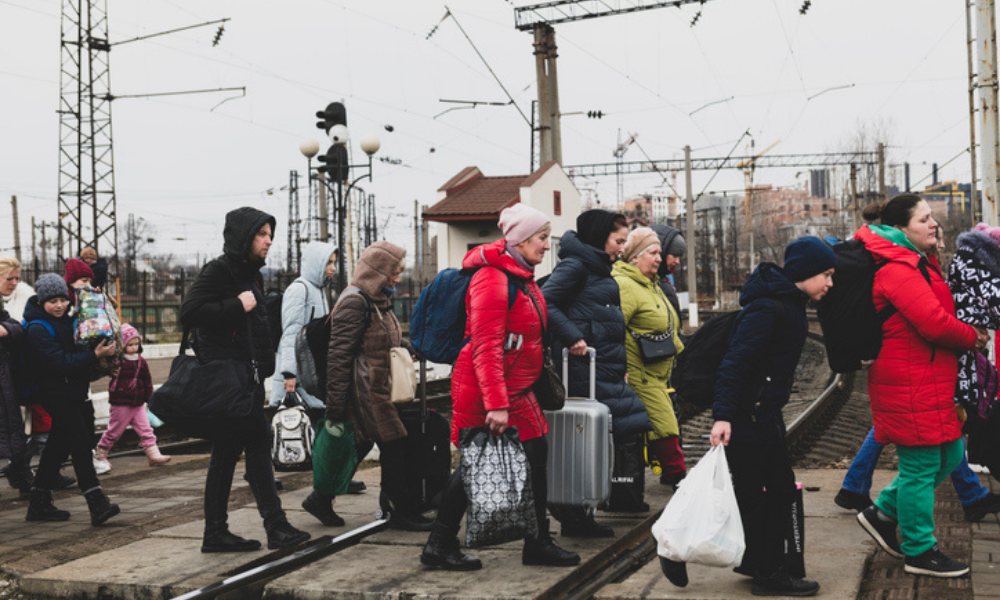'Even if global events do not impact your business directly, it's important to understand it might impact your employees'

As Russia continues its widely condemned attack on Ukraine, a company that has been serving espresso-based beverages to the country for 15 years has announced it is leaving for good.
“Starbucks has made the decision to exit and no longer have a brand presence in the market. We will continue to support the nearly 2,000 green apron partners in Russia, including pay for six months and assistance for partners to transition to new opportunities outside of Starbucks,” the Seattle-based company said in a press release.
This follows burger behemoth McDonald’s who also temporarily suspended operations for its 62,000-strong workforce, and many others western companies who left, after expressing their disdain for the Russian invasion.
Many other firms, such as IKEA, have also indicated plans to leave the war-torn region.
“For any Tesla employees who is a Ukrainian national and has been asked to return to Ukraine for active duty as a reservist, we will maintain their employment and salary for [three] months, with a view to assessing after this period as needed,” says the company in an email, as originally published by CNBC.
The company is also offering free charging in neighbouring countries to those fleeing the conflict.
“Although Tesla does not officially operate within Ukraine, any of the country’s estimated 5,000 Tesla owners can access free Supercharging at select stations in Poland, Hungary Slovakia.”
What about those who stay?
But for those organizations — especially those who provide aid to people in crises and want to remain — who have workers still in the region, what should be done to protect workers left behind in a war zone?
Employers should have two kinds of plans: a duty-of-care strategy to mitigate the risk of employees around the world — thinking about natural disasters and human-made ones like war — and a traditional, strategic plan to protect employees on a day-to-day basis, says Lisbeth Claus, emerita professor of management and global HR at Willamette University in Salem, Ore.
“I don’t see it just as an HR role, I really see it an integrated team that has to plan and then they have to implement. What did Julius Caesar, say? ‘You prepare for the worst, and you hope that you’re never going to have to use it,’” says Claus.
When it comes to planning for their safety, it also matters greatly what type of work the people are doing in country, says Anthony Fee, senior lecturer in the management discipline group at the University of Technology in Sydney
“In the aid sector, one of their starting principles was to protect your safety: we want you to be embedded within the community in which you’re working. Not to put you in a compound with razor wire and double locks on the door that separates you from the community but have you living with the community and developing relationships and learning the language and so on. For them, that was the strongest support that they could do.”
But as the war rages on, countries such as Canada are pledging to support those coming to escape.
In addition to supporting these expat employees, events that happen overseas can have a negative effect for those workers who remain working but cannot escape hearing about such devastating news.
“Even if global events, such as the Russia-Ukraine conflict, does not impact your business directly, it’s important to understand it might impact your employees or their extended family. Being open to talking about it is important as it shows sympathy. This will help create a safe and open space for conversations to take place, which is beneficial especially for those who are directly impacted,” says Andrew Caldwell, HR manager at Peninsula Canada.
As well, checking in with employees regularly to assess how they are processing these happenings is key in managing the stress levels.
“Acknowledging who is directly affected or feeling overwhelmed is the first step. Employers can offer an employee assistance program (EAP) that can provide professional support to assist employee’s mental health and emotional wellbeing,” says Caldwell.
How to help from home
As well, employers might want to think about donating to charitable organizations who are helping on the ground, or even organize team-based efforts to get money to suffering people in Ukraine, as another way to help workers feel like they are helping and stem feelings of hopelessness.
For the City of Winnipeg, it is providing a tangible way for those escaping conflict to find new opportunities.
“We’re proud the job portal can now be used to help in a crisis and give hope to Ukrainians that if they come here, even temporarily, they could have a job before they even leave Ukraine. It gives them some certainty in uncertain times,” says Yvonne Kinley, YES! Winnipeg’s director of talent and workforce, in a statement.
The new effort will provide refugees with free access to local job listings, says Kinley.










